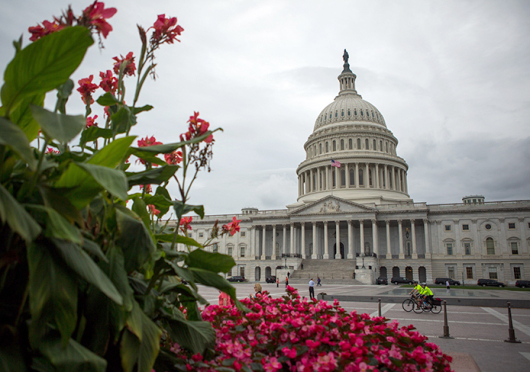
Action items such as Pell Grant award amounts and the Affordable Care Act were included on the House of Representatives’ Fiscal year 2016 budget, which was released last week and passed through the House on Wednesday. Credit: Courtesy of TNS
The Republican-controlled House of Representatives passed its fiscal year 2016 budget Wednesday, which has been met with mixed reactions from some students and leaders.
The budget was released last week by House Republicans and passed with a vote of 228-199. It included action items such as freezing the maximum Pell Grant award amount for the 10-year budget window, as well as repealing the Affordable Care Act, more commonly referred to as Obamacare.
Pell Grants are direct grants awarded to students with financial need who have not received a bachelor’s or professional degree, according to the Free Application for Federal Student Aid website. The current maximum award amount for the 2015-16 award year is $5,775, according to the website.
California Rep. Eric Swalwell said freezing Pell Grants hit home for him during a college media call Wednesday. Swalwell said he was only able to finish school through the use of financial aid and still holds $100,000 in student loan debt.
“President Obama and House Democrats have expanded Pell Grants in the past, but the GOP budget is going to freeze them in place so they don’t expand with the cost of living,” he said.
According to the House of Representatives Budget Committee, the freezing of Pell Grants makes the program “permanently sustainable so that it is able to serve students today and in the future.”
The budget also repeals the ACA, which young Americans should take personally, said Natasha McKenzie, president of College Democrats of America.
“The ability to know that I can stay on my parents’ insurance and then go out into the world and take risks is something I need in my early career to ensure I have a chance to get ahead like everybody else,” McKenzie said on the call. “That is why the GOP’s budget is devastating to young people like me.”
McKenzie said 5.7 million young Americans have health insurance through the ACA and another 2.3 million have the ability to stay on their parents’ insurance.
James Alford, a fourth-year in international studies and psychology and the former president of the OSU College Democrats, said he thinks many students benefit from the ACA.
“The Affordable Care Act is extremely popular among young people,” he said. “Being able to stay on parents’ health insurance until 26 has made college a more affordable reality for many Americans.”
The House of Representatives Budget Committee noted repealing the ACA would save $2 trillion.
Levi Cramer, a second-year in political science and a spokesman for the OSU College Republicans, said he believes keeping the ACA would hurt students more if it were kept than if it was repealed.
“When looking to repealing the Affordable Care Act, it’s important to realize that that doesn’t automatically mean a college student is going to be dropped from their parent’s coverage,” he said. “Before the days of Obamacare, many plans allowed parents to keep their children on their plan, so long as they were at least part-time students.”
During the call, DNC Chairwoman and Florida Rep. Debbie Wasserman-Schultz referred to a budget as a moral document.
“A budget is a document that really lays out where your priorities are,” Wasserman-Shultz said. “In this case, it is abundantly clear where the GOP has laid theirs. In exchange for tax cuts for the wealthy and big corporations, they want to throw young people off their health insurance and gut Pell Grants for low and middle income families.”
Alford, of the OSU College Democrats, said he sees the Republicans’ actions as harmful to college students.
“The attack on Pell Grants obviously makes it more difficult for college students to pay for college, which is already extremely expensive,” Alford said. “It’s an attack on both students’ rights and students’ abilities to educate themselves. Everyone knows that a successful Western economy runs best with well-educated people and it’s just really sad to see this sort of deterioration.”
But Cramer said he thinks the plan will fiscally benefit Americans.
“I think it’s a good thing that we are seeing a balanced budget be proposed,” he said. “Too often, Congress spends more than they have in an attempt to create an ideal world, when (in) reality, we need to be sure that we’re cutting back our spending to meet the revenues they’re taking in.”


